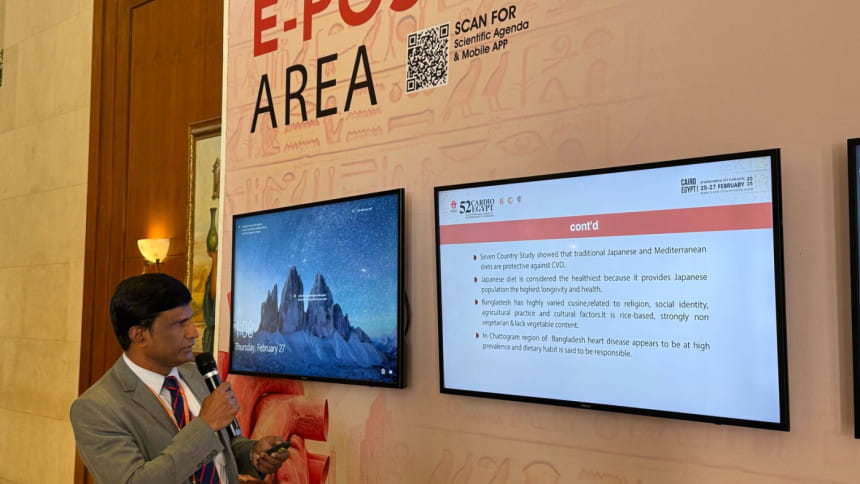Bangladeshi cardiologist presented research paper at the 52nd Cardio Egypt Congress 2025

Prof Dr Prabir Kumar Das, Secretary General of the Chattogram Heart Foundation and former Head of the Department of Cardiology at Chattogram Medical College, presented his research on "Dietary Habits and the Risk of Myocardial Infarction (Heart Attack): A Case-Control Study" at the 52nd International Congress of the Egyptian Society of Cardiology, held at the Hotel Intercontinental in Egypt from 25th to 27th February 2025.
His study focused on patients admitted with acute myocardial infarction (heart attack) at Chattogram Medical College Hospital and four other hospitals in Chattogram. He compared the dietary habits of these patients with those of an age- and sex-matched control group. The findings revealed that higher consumption of red meat and lower intake of fish, fruits, and vegetables were significant factors contributing to heart attacks in these patients.
The Chattogram region of Bangladesh has a higher incidence of heart attacks, and dietary factors are believed to be a major contributor. The research findings presented by Dr Das provide strong evidence supporting this assumption.
The Egyptian Society of Cardiology expressed deep appreciation for his outstanding presentation and insightful analysis. They highlighted that his impactful research, which captivated the audience and enriched their knowledge, would contribute to the prevention of heart disease and heart attacks in Bangladesh, Egypt, and other countries worldwide.
It is worth mentioning that research on diet and heart disease is limited in Bangladesh, making this presentation a pioneering effort for any researcher from the country. Dr Das emphasised the need for nationwide research on dietary habits and their impact on heart disease to address the rising incidence of cardiovascular diseases in Bangladesh.
He further stressed the importance of recognising dietary factors as a key contributor to the increasing prevalence of ischaemic heart disease, particularly in an era of changing dietary patterns, nutritional transition, and globalisation.

 For all latest news, follow The Daily Star's Google News channel.
For all latest news, follow The Daily Star's Google News channel. 



Comments